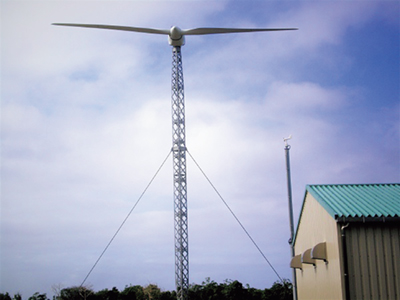(9) Securing Access to Resources and Energy
The number of people without access to electricity in the world is estimated at around 840 million as of 2017, and more than 570 million in Sub-Saharan Africa (more than approximately one in two people in this region). In Sub-Saharan Africa, it is estimated that around 900 million people will still be relying on fuelwood (e.g. charcoal, kindling) for cooking in 2030, which produces indoor air pollution that is one cause of death among youths. The lack of electricity, gas and other energy supplies also leads to many issues, such as the delay in industrial development, a loss of employment opportunities, and a further increase in poverty. Stable energy supply and appropriate consideration to the environment are essential since the global energy demand is expected to increase further, mainly in emerging and developing countries, particularly in Asia.
●Japan’s Efforts

Tiltable wind turbine set up in Tonga through the Project for Installation of Wind Power Generation System (Photo: JICA)
In order to realize sustainable development in developing countries, Japan works on the provision of services which enable modern energy supply and the stable supply of electricity for industrial development. In addition, Japan provides support for the establishment of an environmentally friendly infrastructure (socio-economic infrastructure), such as the construction of energy-saving equipment and power generation facilities that utilize renewable energy (hydropower, solar photovoltaics, solar thermal, wind power, geothermal power, etc.). For example, Japan is providing assistance for the construction and rehabilitation of geothermal power plants in the Olkaria geothermal field in Kenya, utilizing ODA loans for clean and stable power supply regardless of weather, which contributes to a total of around 400 MW of power generation. Moreover, in Pacific island countries with limited and scattered land, which are vulnerable to the influence of climate change, Japan, under the “hybrid island concept,” is providing assistance to improve the efficiency of diesel power plants and mainstream grid connected type renewable energy to achieve the reduction of greenhouse gases and fossil fuel consumption, from the perspective of energy security and climate change measures.
In view of the major global shifts occurring in both the supply and the demand sides of the energy sector amidst the increasing momentum of international initiatives towards decarbonization initiated by the Paris Agreement entering into force, the Ministry of Foreign Affairs (MOFA) announced in July 2018 that it will advance energy diplomacy, which responds to the world’s energy situation and continuing energy transitions. Moreover, at the Foreign Embassy Strategy Council on Energy and Mineral Resources held in February 2019, members of MOFA gathered together with members from overseas diplomatic missions, other relevant ministries, attendees from various organizations and the private sector, and experts to discuss the challenges and measures related to securing a stable supply of energy and resources in Japan. The meeting contributed to the further strengthening of Japan’s energy and resources diplomacy, as well as a common understanding on several issues in this area. For example, the participants recognized that the energy policies of each country under the recent energy situation have both direct and indirect influences not only on the energy situation of the neighboring countries and regions but also that of the whole world. Secondly, amid the diversifying environment surrounding the international energy situation and increasing uncertainty, the participants also shared the importance of the role of overseas diplomatic missions to accurately grasp the current situation regarding energy policies and supply/demand situations in their respective countries in order to establish a system that allows them to respond swiftly even to short-term changes, while maintaining a long-term outlook.
Japan also supports the Extractive Industries Transparency Initiative (EITI), which is a multinational cooperative framework to increase the transparency of the money flow in the development of oil, gas, mineral, and other resources. Under this framework, extracting corporations report the amount of payment to the governments of resource-producing countries, and the governments also report the amount of the revenue to the EITI in order to ensure transparency of the money flow. In addition to 52 resource-producing countries and many supporting countries including Japan, extracting companies and NGOs are participating in the EITI, and working together to prevent corruption and conflict, as well as to encourage responsible resource development that leads to growth and poverty reduction.
